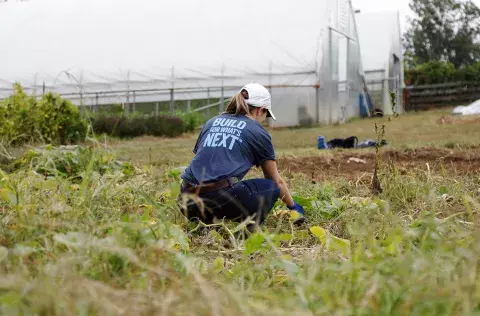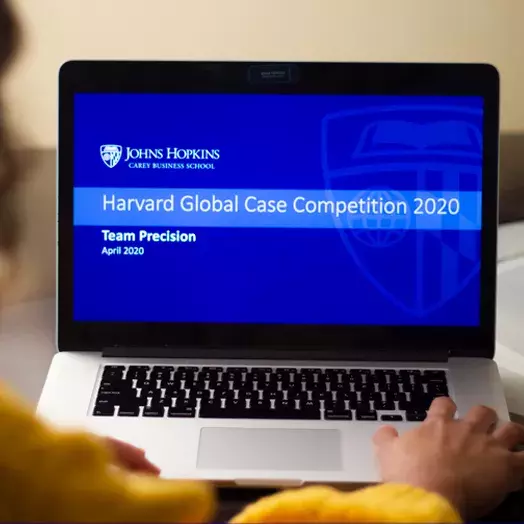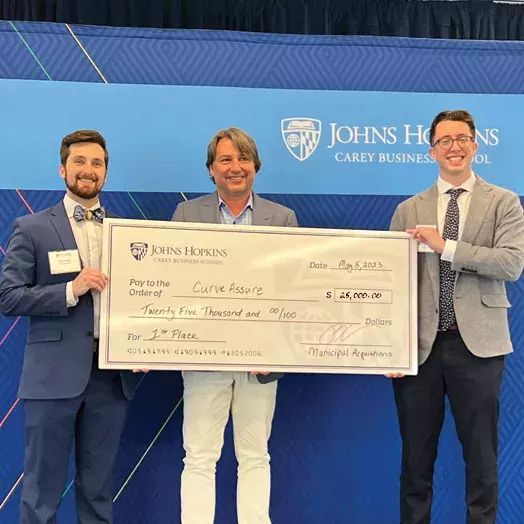Search
Alumna uses MBA/MSN to open sixth clinic for ambulatory OB/GYN outpatients
Two MBA graduates make Poets & Quants Best and Brightest list for 2025
Experiential learning opportunities: Master of Science
Experiential learning opportunities: Master of Science

Related Pages
Student Experience
Augment your MS curriculum

Augment your course learning with co-curricular (non-credit) opportunities tailored for your career. From two-year fellowships to one-day impact sprints, put your skills to the test, tap into the Johns Hopkins ecosystem, and build your network.
Explore all co-curricular opportunities.
Co-curricular highlights
Hexcite
At the Hexcite early-stage medical software accelerator, match with Johns Hopkins care providers who have an idea to create and market a software solution that improves patient care. Join a team of graduate students from across Johns Hopkins to engage with the new health technology software from every angle and bring the care provider's innovation to market.
Student Venture Showcase
Pitch your proposed business venture for the opportunity to receive over $15,000 toward your concept.
MS in Health Care Management
Put your in-depth understanding of complex health care issues to work. Apply practical management skills and build innovative business solutions for large health care issues.
MS in Health Care Management students choose a two-part experiential learning course:
- BU.890.711/2 Health Policy Design and Implementation I and II
- BU.890.713/4 Health Care Strategy Consulting Practicum I and II
- BU.890.715/6 Health Services Improvement Project I and II
- BU.890.717/8 Commercializing Biomedical Innovations I and II
Learn more about the MS in Health Care Management curriculum
Featured news

student experience
Carey Places at Harvard Case Competition
student experience
Entrepreneurship with an edge: How the Student Venture Competition launches student startups
student experience
Carey Places at Harvard Case Competition
student experience
Entrepreneurship with an edge: How the Student Venture Competition launches student startupsCareer Resources
Career Resources

Your career journey starts here
Johns Hopkins Carey Business School offers extensive resources to support you in your career development and advancement.
Build connections for your future
Whether you’re breaking into your career or looking for your next advancement opportunity, the networking opportunities at Johns Hopkins Carey Business School will help you establish connections with the right people and organizations. The diverse and talented pool of faculty, staff, alumni, and students can connect you with leaders in your preferred industry while providing valuable insight for your career growth.
Handshake
Whether you are a student or alumnus, Handshake is your online portal to manage your career and access opportunities.

Students
Students benefit from personalized coaching sessions, exclusive access to employer events and workshops, and thousands of internships and job postings. Handshake provides the resources to begin a job search, advance your career, or switch industries.
Alumni
From finding and applying for the right job to accessing exclusive resources, Handshake simplifies your career advancement and job search. Alumni may continue to access Handshake with their alumni or personal email address.
Career Resources on Demand
Career Resources on Demand is a site that hosts created and curated resources, templates, and educational material to support you in your career and life design journey. You’ll find resources on the following topics:
- Career exploration and life design
- Résumés and cover letters
- Professional story and brand
- Networking
- Job and internship search
- Interviewing
- Career transition and management
- International students
- Diversity, equity, inclusion, and belonging
- Self-care and professional wellness
Students can access Career Resources on Demand in the Career Center Resources section of Handshake. It is also hosted in Canvas.
SMILE: Employment opportunities at Johns Hopkins University

SMILE is the University Experiential Learning platform that connects current students to paid campus internships and employment opportunities across Johns Hopkins University. This platform includes paid campus internships and a variety of student jobs, work-study, and non work-study.
Log in to our campus experiential learning platform, SMILE to search for your next opportunity.
Want to learn more?
Residencies
Residencies

Related pages
Residencies at Carey Business School
The Flexible MBA program at Carey offers a few courses with a required two-day, in-person residency. Sections of three courses – Negotiation, Business Communication, and Leadership and Organizational Behavior – require online students to experience elements of interpersonal interactions to achieve learning goals. Residencies are an opportunity to truly experience the Carey Business School community and network with faculty, staff, and other students.
A typical residency lasts two days and includes opportunities for students to learn directly from their professor, collaborate with other students, and hear from outside speakers. These courses can also be taken in a virtual setting, so no student is obligated to take the sections with an in-person residency component.
-
This course provides students with the foundational knowledge and skills needed to negotiate. Designed around a series of research-based negotiation exercises, the course exposes students to various negotiation situations to help them understand two fundamental approaches to negotiation. By reflecting on these exercises considering negotiation theory, students develop an awareness of their personal negotiation style, including its strengths and weaknesses.
By the end of the course, students will be able to negotiate in an effective, ethical, and culturally appropriate manner.
-
This course refines students’ skills in business writing, public speaking, and interpersonal communication. Through analyses and practice of communication strategies adopted by successful business professionals, students learn to write clearly and concisely, deliver compelling presentations, and construct effective arguments.
-
Leadership requires a deep understanding of human behavior – how we make sense of the world (or fail to do so), how we make decisions, what brings us together, and what sends us apart. Good leaders understand the power of motivation, the benefits and challenges of groups, and how to create a context where others will thrive and perform at their best.
The goal of this course is to help students leverage their knowledge of human behavior to enhance their overall effectiveness within organizations and their ability to lead. This course will provide students with analytical frameworks and practical experience designed to help them put learning into action, whether they are currently in a formal leadership role or not.

“I have had the good fortune to meet and network with my classmates in Baltimore because of the Leadership and Organizational Behavior residency. The experience was invaluable. There was an aura of energy and exuberance that connected all of us as we exchanged proposals, solutions, and ideas. Our professor was brilliant, fun, and kept us engaged as she challenged our perspectives on leadership. The class was dynamic, and it motivated us to be more expressive with our ideas and what each one of us can bring to the table.”
Pria Fajardo, MBA candidate
Registered Nurse, Penn Medicine
Connect with Carey
Connect with Carey

Connect with Carey Business School
Get involved with Johns Hopkins Carey Business School
Carey Business School graduates spend a brief time at school as students, but they are alumni for life.
As a graduate, you are part of a Carey alumni network of more than 26,000 business leaders, entrepreneurs, and innovators. Carey Business School offers numerous opportunities for lifelong involvement – with your classmates, your friends, and your alma mater. Take advantage of everything the Carey Business School alumni network has to offer.
- Update your alumni profile to ensure you will receive the latest news and invitations to alumni events in your local area.
- Bookmark the Carey Business School website to stay updated on all news and events.
Stay connected with Carey
Follow us on social media.
- Facebook JHUCarey
- Twitter @JHUCarey
- Youtube JHUCareyBusiness
- LinkedIn Johns Hopkins University Carey Business School
- Instagram jhucarey
Connect with your classmates online or in person
- Add Johns Hopkins University Carey Business School to your education section on your LinkedIn profile.
- Plan or participate in an alumni event.
Open configuration options
As a Johns Hopkins Carey Business School graduate, you are part of a lifelong community. Find out the benefits of staying connected from alumnus Hao Yu.
Join an alumni club
The Carey Business School is growing its regional club presence to encourage connections among alumni in their own communities. There are currently alumni clubs in:
- Beijing
- The Greater New York City Area
- The Mid-Atlantic
- The San Francisco Bay Area
- Shanghai
- South Korea
- Boston
- Chicago
- Denver
- Los Angeles
All alumni within the region are automatically members of the club.
Learn more about our regional alumni groups.
If you live in an area where a club exists:
- Attend a local event.
- Connect with the club leadership to learn how to become a volunteer leader.
- Follow your local club on social media.
- Provide updated contact information.
If you are interested in starting a club in your area, contact the Carey Business School Office of Development and Alumni Relations
Learn more about our alumni networks
Admissions
- Meet with prospective students for informational interviews.
- Host a Carey information session at your place of work.
- Participate on alumni panels for admitted students.
- Connect with an admitted student and share your Carey experience.
- Host an accepted student reception or a summer send-off party.
Contact our admissions team for more information.
Career development
- Post a job or internship with your organization to Handshake.
- Host an Employer Information Session on campus in Baltimore or Washington, D.C.
- Participate as a guest speaker at one or more speaking engagements, Coffee Chats, or student organization speaking opportunities held throughout the year.
- Serve as an industry panelist and impart career advice to Carey students in a collaborative and engaging format.
- Host Carey Business School students on an Employer Trek at your organization.
- Interact with student organizations by participating in or hosting formal speaking engagements.
- Build a rapport between your organization’s human resources or corporate recruiting office and the Carey Business School Career Development Office.
Contact us, and we will work with you to create a customized experience to engage with talent from Carey.
Executive Education and training
- Attend or send employees to Carey Business School’s innovative Executive Education development courses.
- Assist with the development and delivery of the school’s cutting-edge business content in its Executive Education program.
- Enhance and grow your organization’s team through a customized executive development program.
- Support the growth of Carey Business School’s Executive Education Office by providing brand awareness within your organization and peer group.
For more information, visit our Executive Education webpage or contact our team directly.
Support the annual fund for the Carey Business School
- Make a yearly gift to provide critical support to our students, faculty, and mission.
- Become a member of the Carey Business School Giving Society.
- Include Carey Business School in your long-term financial and estate planning and be part of the Legacy Society.
Learn more about giving to the Carey Business School.
Join the Johns Hopkins University Alumni Network
The Johns Hopkins worldwide alumni network, with more than 222,000 alumni, possesses an unmatched wealth of talent and opportunity.
Get involved with the Johns Hopkins Alumni Association and attend events, participate in social and academic enrichment activities, and connect with fellow alumni.
- Participate in an affinity group and connect with alumni with common interests and shared experiences.
- Visit campus for Homecoming, Alumni Weekend, or anytime to relive the Johns Hopkins experience.
Ready to get involved?
FT MS Group Coaching: In Person (HE)
Jaana Myllyluoma, PhD
About Executive Education
About Executive Education

Executive Education
At Johns Hopkins Carey Business School, we believe in a better business world through advanced education. The Carey Executive Education program helps professionals of all backgrounds navigate today's challenging and dynamic business world with ease. The program is recognized throughout the business world as a leader in business education, producing successful alumni year-after-year. Carey Executive Education is proud to follow in Johns Hopkins’ established tradition as a leading research institute.
Learn more about our Executive Education program. Explore our course offerings online and plan your visit to campus in Baltimore’s Harbor East neighborhood today.
Carey Business School
Founded in 2007, Johns Hopkins Carey Business School supports business knowledge and cutting-edge business education through business initiatives, innovations, and collaborative programs. A business education leader in the Mid-Atlantic, Carey Business School offers full-time, part-time, and certificate programs.
Award-winning Faculty
Thought leaders and award-winning faculty lead courses. As instructors bring their professional experience to the classroom, participants benefit from real-world case studies and prestigious research conducted by industry leaders.
Policies
Visit our policies page for detailed information about registration, payment, and other course-related policies and procedures.